Click on images to enlarge

infestation (Photo: Sheldon Navie)
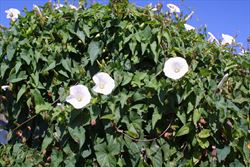
climbing habit (Photo: Trevor James)
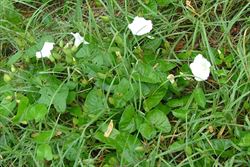
creeping habit (Photo: Sheldon Navie)
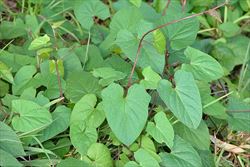
stems and leaves (Photo: Sheldon Navie)
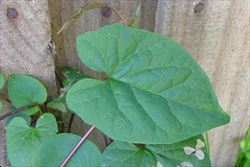
close-up of leaf (Photo: Sheldon Navie)
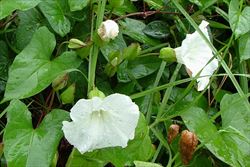
tubular flowers (Photo: Sheldon Navie)
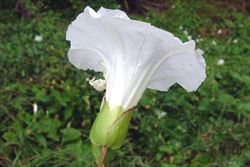
flower from side-on showing the two large bracts that almost hide the sepals (Photo: Sheldon Navie)

close-up of flower (Photo: Trevor James)
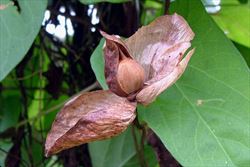
mature fruit (Photo: Sheldon Navie)
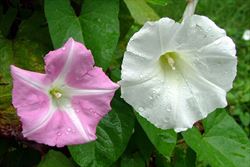
comparison of the flowers of the native large bindweed (Calystegia sepium), on the left, and greater bindweed (Calystegia silvatica), on the right (Photo: Sheldon Navie)
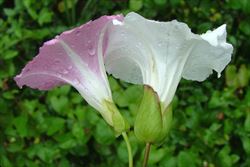
large bindweed (Calystegia sepium), on the left, has smaller pointed bracts while greater bindweed (Calystegia silvatica), on the right, has larger bracts with rounded tips (Photo: Sheldon Navie)
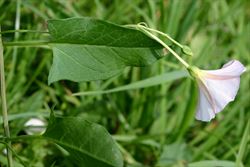
field bindweed (Convolvulus arvensis) is also similar, but does not have any bracts at the base of its flowers (Photo: Trevor James)
Scientific Name
Calystegia silvatica (Kit.) Griseb.
Synonyms
Calystegia silvatica (Kit.) Griseb. subsp. disjuncta BrummittCalystegia silvatica (Kit.) Griseb. subsp. silvaticaCalystegia sylvaticus Griseb., orth. var.Convolvulus silvaticus Kit.
Family
Convolvulaceae
Common Names
great bindweed, greater bindweed, hedge bindweed, large bindweed, shortstalk false bindweed
Origin
Native to southern Europe.
Naturalised Distribution
Naturalised in many parts of south-eastern Australia (i.e. in central and southern New South Wales, southern Victoria, Tasmania and south-eastern South Australia). Also widely naturalised in New Zealand.
Notes
Greater bindweed (Calystegia silvatica) is often a weed of hedgerows, gardens, pastures, disturbed sites and waste places in temperate regions. However, it also invades forest margins and riparian areas. For example, in the Tamar Valley region in Tasmania, it is invading bushland along walking trails and infests the margins of the River Tamar. It is also regarded as an environmental weed in Victoria, where it is thought to pose a serious threat to one or more vegetation formations.

